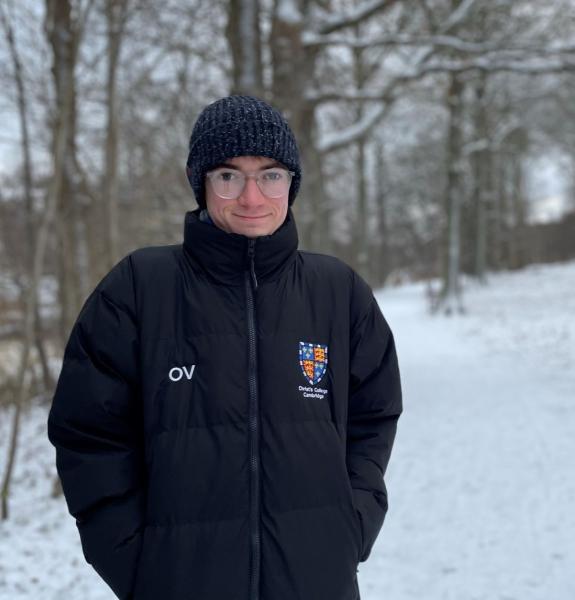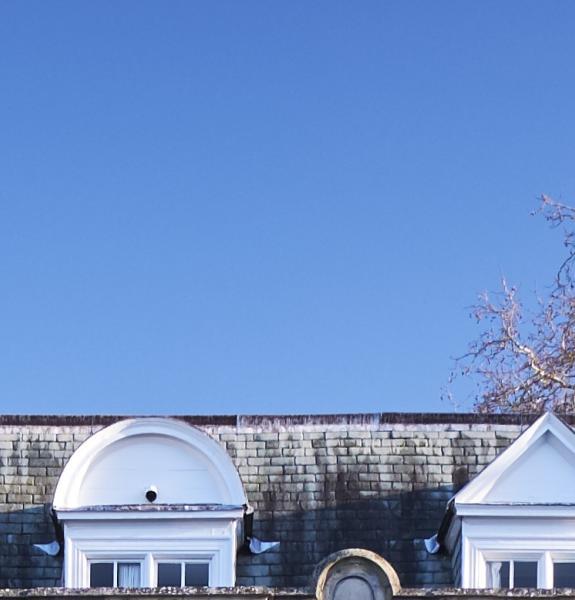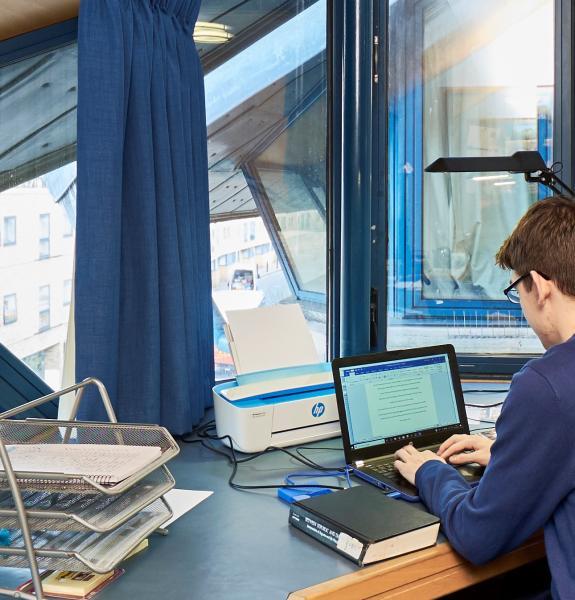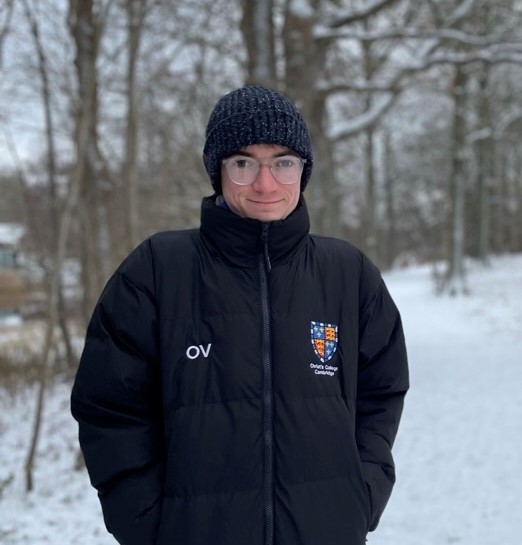
Ossie wrote this at the end of his second year studying History. He is from Middlewich, Cheshire, and was home-educated from Year 7 (age 11). Ossie did GCSE's in English Language, English Literature, French, Geography, History, Physics, Biology, Mathematics, and Psychology. His A level subjects were History, Geography, and French, and he also did an AS-level in Politics.
Why did you apply to Christ’s?
I was drawn to the college by its reputation for History, having produced a number of renowned historians over generations. Once I was looking more closely at the college, I realised how much more support the college’s Admissions Department was offering than other colleges in terms of webinars and online information and resources, which was really appreciated during the pandemic. For me, that was emblematic of a community that cared about both its current and its prospective members.
Has Christ’s lived up to your expectations?
Christ’s has exceeded my expectations. Coming from a home-educated background, I was concerned about how I would adapt to a university environment surrounded by other students, let alone coming to Cambridge. Almost immediately, Christ’s felt like home and quickly became the centre of my life. I absolutely love it here and I am very proud of the wonderfully close-knit community the college offers.
What do you think of the collegiate system in general?
I think the collegiate system is one of Cambridge’s best assets. The existence of smaller communities within a broader university means that everything is much more accessible and personal. Your college feels like your home and the people in it become almost like family. Living in such close proximity, where you eat, study and socialise together daily means that the community feels vibrant and you become quite attached to your individual college. Each college is unique and it is always exciting to discover new ones and learn their individual characteristics and intricacies.
Do you have any advice for students struggling to choose a College?
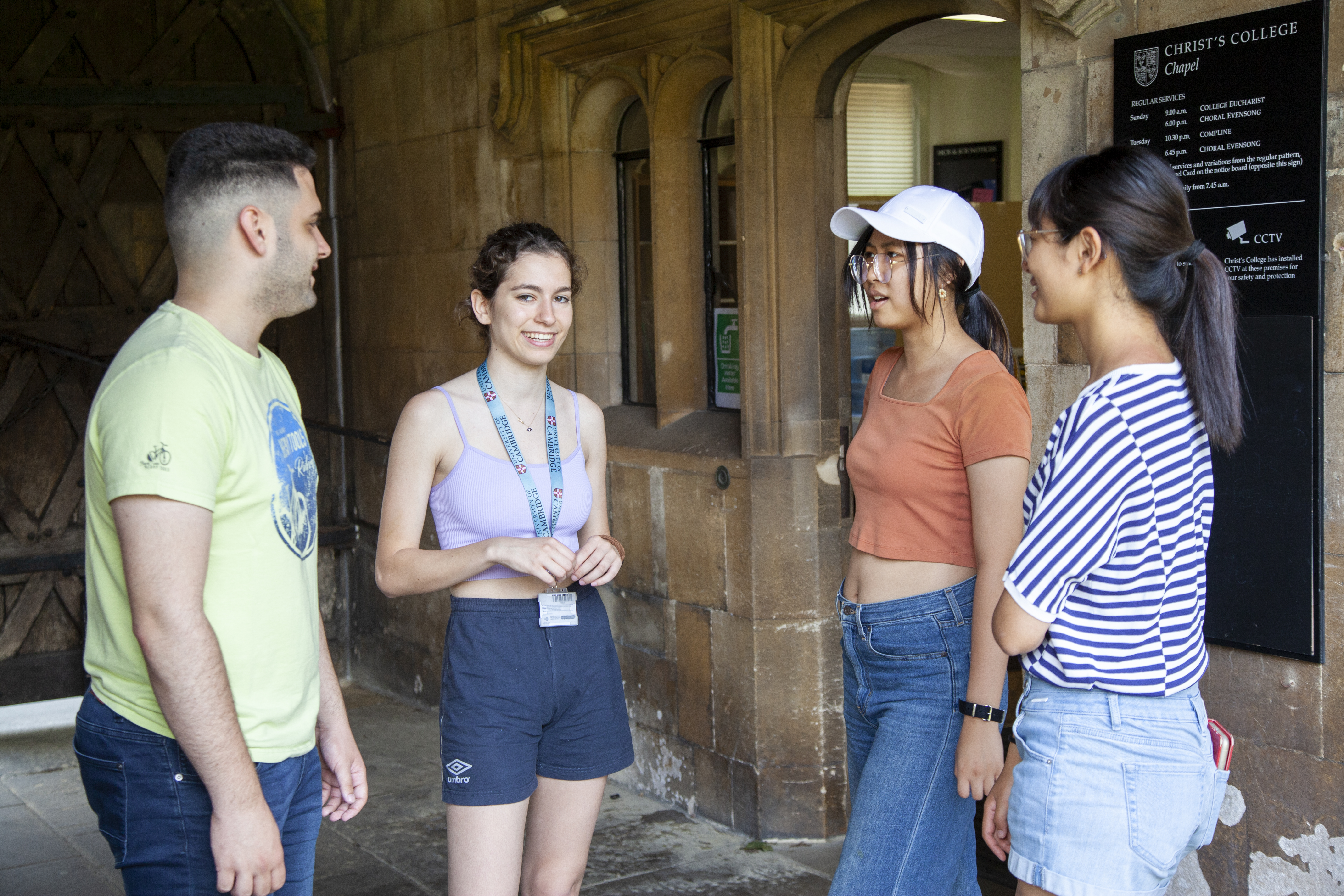
It took a bit of time to understand the collegiate system. I had to have a look at a few colleges before deciding Christ’s was a good fit for me, for the aforementioned reasons. It can certainly be a bit daunting to get your head around all the individual colleges, but I sometimes try to think of the university as a country like the USA or India, and the colleges are individual states within that country. They are all ultimately quite similar and are very much part of Cambridge, but they each offer their own microcultures, both academically and socially. One college may be more social or attract more sporty people, where another may be more oriented towards academic pursuits. Some colleges are significantly older, which makes them more traditionally Cambridge-like aesthetically, but that can also mean the accommodation is less conventionally comfortable. It is definitely worth properly researching a few colleges before deciding. You will have the same academic experience and often access to similar resources at all colleges, but your social experience may differ.
Have you received any particular support from college?
Absolutely. The college has been very supportive in providing financial support to me at various points. They recently completely subsidised my research trip to northern India for almost a month. Over the past few years, they have also been supportive in providing accommodation outside of termtime, whether for academic or personal reasons. The college’s tutorial system means that there is always someone to assist your pastoral needs, and there is also a free counselling system to support student welfare through their degree.
What attracted you to your course?
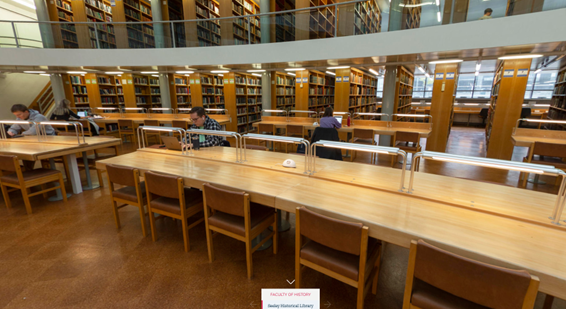
I initially studied History and Modern Languages (French) but changed to study History on its own so I could concentrate wholly on one subject. I really enjoyed both History and French at A Level and wanted to continue both (although I later struggled to balance this). I really appreciated the skills of research and argument that History taught me at A Level. Diving into a totally new topic and getting to grips with all the information so that you can craft an interpretation of events is something I love, and the novelty still hasn’t worn off! History is such a vibrant discipline with so much to study, constantly producing new perspectives, that you can never run out of new things to learn about.
Was there anything different about your course compared to courses at other universities?
Like most Cambridge degrees, the History course here is faster paced than other universities, which catered to the novelty that I appreciated in the subject, especially when taught by experts in their field. Every week you encounter a completely new subject and have to dive into a pile of reading to equip yourself with the tools to write about it in an informed manner. If you don’t click with a topic, you will quickly move onto one you do like. While this can be a rushed approach to studying – you won’t learn all of the history of the Ottoman Empire in five days – it teaches you very useful skills in processing a lot of information in a short time.
Was there anything that you were nervous about?
I was very nervous about adjusting to having actual teaching, rather than leading my studies by myself. However, this quickly eased given how welcoming and supportive all of my supervisors were. Similarly, I was worried about the workload. I remember being nervous about how to take notes in lectures, but, like everything else, you quickly get used to it. I quickly adjusted to the quantity and began to appreciate the skills it was teaching me. After some time, you enter into a rhythm of studying that keeps you well-paced.
It’s completely normal to be nervous about university, but you quickly get used to everything. As I have progressed through my degree, there has been a greater amount of coursework – which was completely new to me as a home-educated student – but I have come to appreciate this. Where the weekly supervision essays test your ability to digest vast amounts of information quickly, turning them into a coherent argument, coursework enables you to get lost in a subject and pursue your interests. You can follow rabbit-holes of information and find really interesting stuff that adds a unique edge to your work. I think that the coexistence of these two different kinds of work has really helped me to become a better researcher, writer and overall, a better historian.
How did you find the application process?
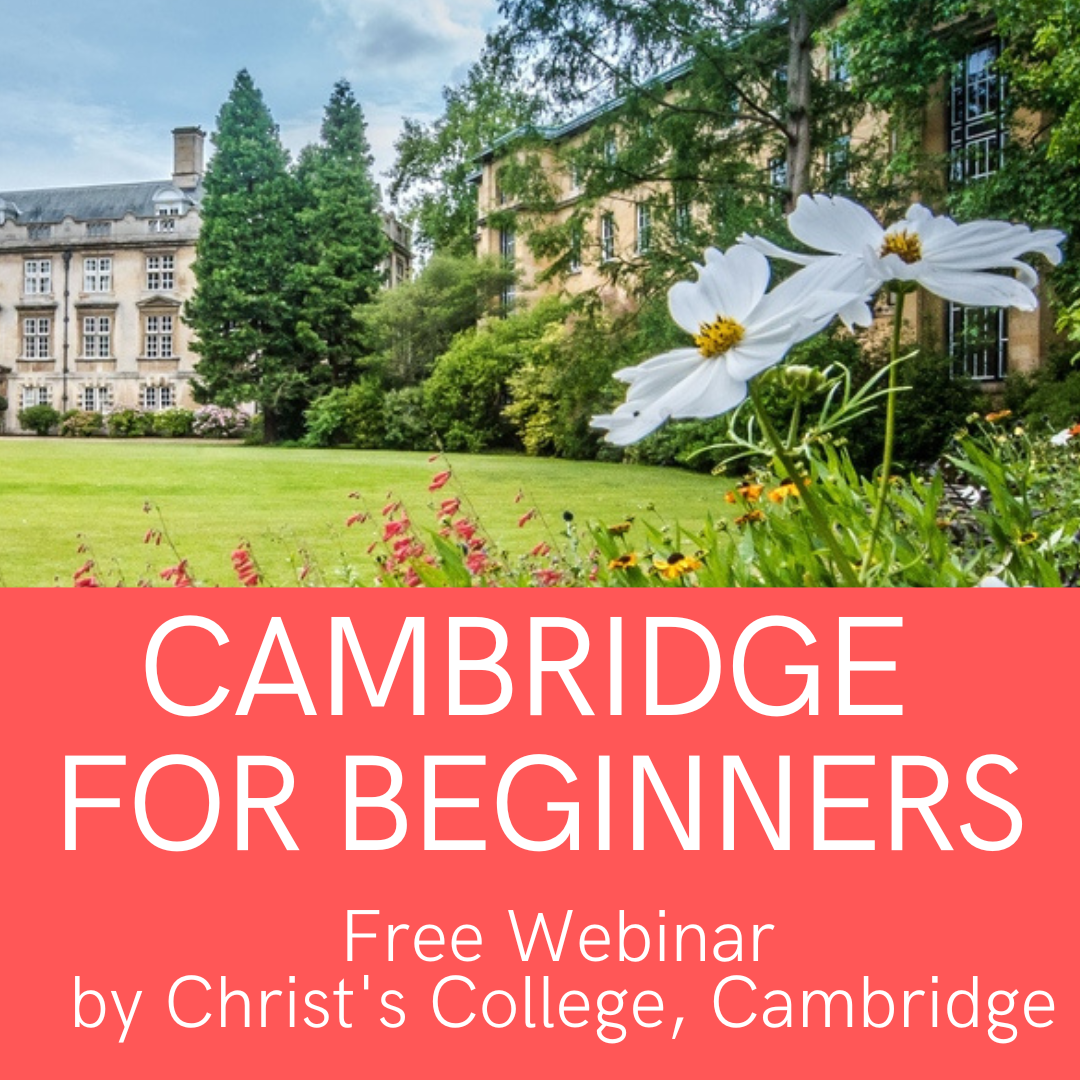
As someone coming from a self-/home-educated background, I sometimes found the application process a bit like trying to get a square peg in a round hole. Working around things like trying to get references and even fill in my UCAS form was a challenge. But it was worth it. I put a lot of work into writing a personal statement that reflected my interests and showed my excitement for the possibility of studying my degree. I felt that Cambridge, more than the other universities I applied to, gave me a lot of space to really talk about my experiences and how they had shaped my education. I contextualised what I had achieved academically and was very comforted because it felt like the university genuinely wanted to view my application holistically.
I was extremely nervous for my interview and couldn’t believe I had actually been invited for one! I went into it expecting a horrible grilling over everything I’d written in my application, but the experience was actually a unique balance between being fun and nerve-wracking. The interviewers were very welcoming and were trying to understand my thinking process. Where I had got close to reaching a conclusion, they helped me towards it, but were also very keen to see my ideas and then test them. Regardless of the result I would eventually receive, I tried my best to just enjoy the opportunity to have an academic discussion with four people who were world leaders in subjects I was passionate about.
How did you prepare?
I possibly overprepared for my interview. I went through every line of my personal statement and the submitted work to see what I had written. I did additional reading on everything I said and tried to think of counter-arguments that could come up, and how I would address them. I did a lot of practice (sometimes in front of the mirror!) just talking through possible questions and how I would handle it.
Students invited for interview in languages also have an online admissions assessment. I went through all the previous example tests I could find online and tried to sit them in exam conditions. I also tried finding some similar texts online that I could analyse in the style of the exam. This was quite helpful in ensuring that what came up on the day wasn’t totally new to me and giving me some confidence for the assessment.
What were the challenges of applying as a home-educated student?
For me, there was an element of disbelief that someone from my educational background could actually make it into Cambridge, given all my preconceptions about the university. I think this disbelief characterised a lot of my early application until I reached the interview stage and I felt that my application was being taken seriously. Obtaining references and submitting work could be challenging, but I managed to work through it and I’m very glad I did.
What specific advice would you give prospective applicants?
My advice would be to do as much research as possible about the course, colleges and the application process. Do interview and assessment practice to ensure you are well-prepared. Alongside these conventional bits of advice, I think I would recommend being confident in yourself. If you are genuinely interested in the subject you are applying for, the best thing you can do is show that, and being confident is vital to achieving that. For home-educated students, I would say the same. It is absolutely attainable to study at Cambridge from a home-educated background, provided you are passionate about your studies and are achieving at a high level. I really hope to see more home-educated students at Cambridge, and the best way to do that, is to have more home-educated applicants. Cambridge is for everyone, and I think reminding prospective students of that is the best advice I can give.
Before you came to Cambridge, what were you looking forward to and what were you most worried about?
I was very excited (but also nervous) about the prospect of re-entering a highly social environment. The idea of living in such a historic place as Cambridge was very exciting for me, and I couldn’t believe it was actually happening. I was nervous about adjusting to the workload, but, like for most people here, this happened very quickly.
I think it was quite easy to settle in. The best thing to do is to just throw yourself completely into whatever you’re doing, in my view. Try as many new things as you can and try to get to know people, as there are so many unique opportunities to do so in Cambridge. It’s completely normal to feel homesick or nervous, and it was reassuring for me to think that everyone was going through the same thing. Within no time at all, Christ’s really felt like home.
I think my favourite part of freshers’ week was just meeting new people from all over the world. I had never been in a new place that had so much diversity and it was great fun to learn more about where people were from. I remember the feeling of first moving into college and seeing my new room and just being very excited!
It was great to learn how normal it felt being here. Although I’d been quite nervous about coming to Cambridge because of its reputation and this aura of tradition surrounding it, the actual time of being here felt completely normal.
How did you find starting lectures and supervisions etc.?
I really enjoyed my first lectures and supervisions, especially as they were such a different style of learning to what I’d previously experienced. Now having someone leading my learning and pointing areas to improve was very helpful. I also just found the experience of having lectures that were highly informative and having discussions with my supervisors really enjoyable.
I think that on the whole, the experience of the interview and attending a few preparatory courses organised by the college meant that I was well-prepared for supervisions. The experience of an interview that was informative, challenging and interesting was definitely replicated in supervisions.
What is different with your work now, compared to what you experienced in your previous studies
Unlike a lot of students at university, people from a home-/self-educated background suddenly find themselves with more support than when they were at school. I think the experience of having to be independent in my learning and rely on my own resources to progress prepared me quite well, especially for a degree like History, where so much of the learning is spent on your own. However, having far greater to access to resources, both through people, libraries and online, now makes it much easier.
What are the best and hardest things about your course?
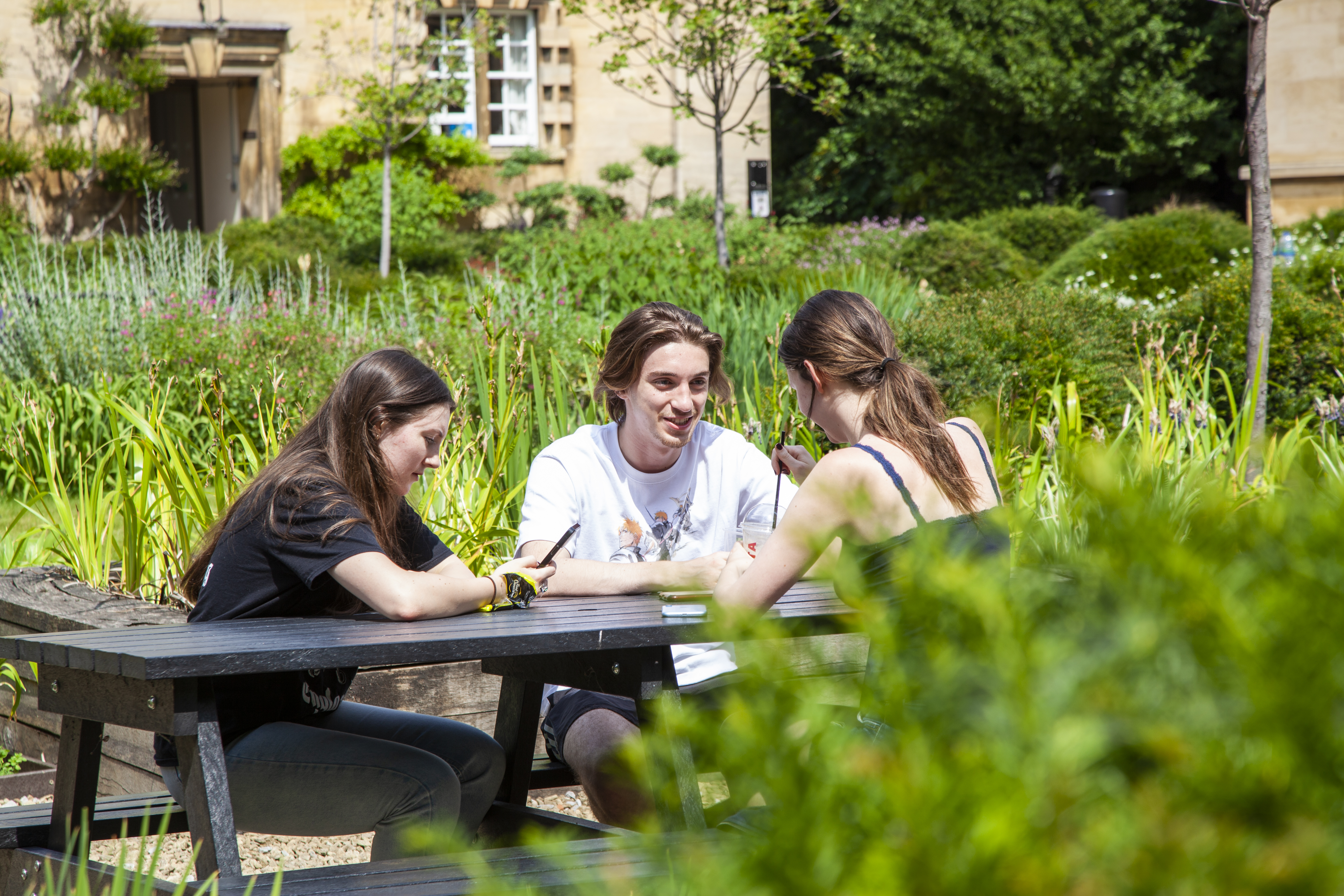
I think the hardest thing about my course and the best thing about my course are probably two sides of the same coin. The quantity of work is sometimes like being buried beneath an avalanche, particularly when it comes to exams and you have to pull years’ worth of content together in a short period of time. However, that avalanche of material is also why I love the degree. The high speed and breadth of the course has enabled me to study such a range of topics in a short period of time, and, with time to properly revise them, actually become very familiar with them. I have been lucky enough to study a really diverse range of topics in my first two years, from early modern British politics to nineteenth-century Japanese industrialisation. Through this breadth I have been able to find new areas of history that I had never touched and have now become my primary interests.
Is the course what you expected it to be when you applied?
I think that overall the course has been similar to what I expected, but it has really challenged me in a lot of constructive ways. Up to my degree, studying History was a very structured process, where different topics were separated and questions about interpretation were avoided altogether. Now, all of that is confusingly but rewardingly mashed together. The degree has been different in that it has taught me to always be sceptical about making assumptions and just taking an interpretation as gospel, which I think is really important for someone working on History, but also in general.
Looking back over the year, what do you feel you have got out of it so far?

The past year has been both challenging and rewarding for me. I came to the start of the year a little disappointed with my first-year grades, despite having tried my hardest for them. But that helped in two ways. Firstly, it reminded me to detach both my learning (and my enjoyment of the degree) from the grade I received at the end of the year. Secondly, it was a little nudge to rethink where I could improve as a historian. I have tried to be more creative in my writing and in my approaches to studying. But away from that, I have really benefited from the opportunity to prepare for my third-year content. Planning my third-year dissertation, which looks at relationships between French expatriates and Indian rulers in late eighteenth-century Awadh (a small state in what is now Uttar Pradesh), has been really exciting. Not only has the college paid for me to go to India (which was beyond incredible), but it has pushed me to this stage where I am not only working to tick boxes for exams, but to actually create my own original work in a field of my choice.
What has been your favourite supervision from this year?
I think my favourite supervision was probably one about ‘Polite Culture’ in eighteenth-century Britain, for the compulsory British Social and Economic History paper. I hadn’t really clicked with the topic, or the paper in general, and found it very abstract and inconsequential in places. However, my supervisor was incredible in taking a week of what I had seen as fairly unexciting material and breathing life into it. The way he encouraged me to think about it raised questions about British culture and how it connected to issues of class, gender, consumerism and imperialism.
How does your teaching work?
In my first two years, I have had one supervision per week, each covering a different topic from a broader paper. Normally there are between four and six lectures per week, sometimes with seminars in between.
It definitely takes some time to get used to the workload. However, you quickly work out a method to manage it, and that method is different for everyone. The benefit of having a timetable and weekly supervisions is that you build a structure for your work, so you have something of a weekly timeline or where you should be in your work. Once I had established this, I was able to create a good balance between work and my social life.
Where do you typically like to work?
I’m quite nomadic in my working habits! The university has so many different places to study and I really like to take advantage of that. I often work in one specific library or café for a few weeks before moving to another one. Some favourites for me have been the Centre for Mathematical Sciences, the Whale Café and the Centre for South Asian Studies. I find that moving around a lot helps to keep studying exciting and it allows me to concentrate on my work. However, I know a lot of people prefer to have a fixed location that they stick to.
What is your favourite thing about the college?
It is such a cliché to say ‘my favourite thing is the people’, but I’m going to say it. When people said that about Christ’s when I was a prospective student, I thought it was overly sentimental and probably scripted. However, I have really become attached to the community that the college has and I love the people who make up that community. Christ’s really does feel like home, and on top of the lovely environment of the college, the people really make it special for me. On the other hand, my least favourite thing is possibly the college library, which the college is working on plans to change. However, this is only a small issue with the college for me.
What do you do when you’re not working?
I am involved with the college’s student union, called the JCR. In my first year, I was one of the JCR’s elected Welfare Officers, but this year I have worked as its President. I absolutely love working on the JCR as it means I get to meet loads of the college community and get involved in things like meetings. I also have been trying to get involved in more sports, so I am now playing football and squash every week. I additionally take Hindi lessons twice a week at the Asian and Middle Eastern Studies Faculty, and am hopefully starting to learn Persian next year.
What have you enjoyed most about life at Christ’s this year?
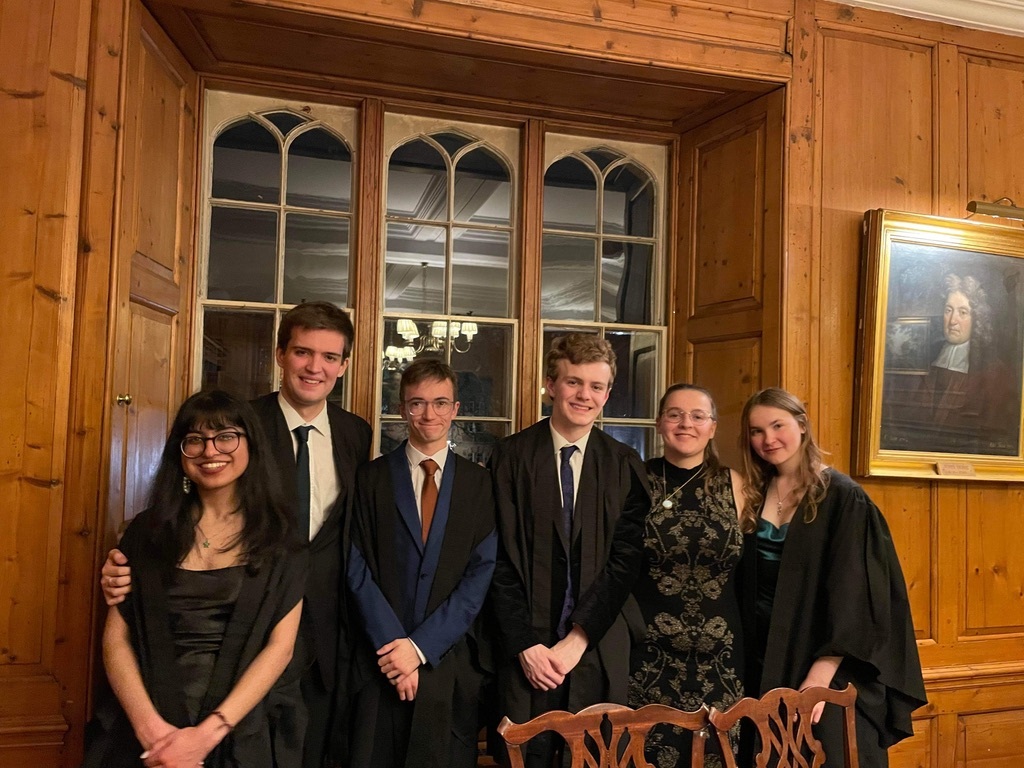
I have really enjoyed working with the JCR this year. Getting involved in the college community and trying to improve the student experience has been very rewarding for me. But I think my best memory of Christ’s this year was when I finished my exams (I was the last person to finish in college) and about 15 of my friends were waiting outside my balcony on the roof, waiting to shoot me with water guns and water balloons.
Where have you lived this year?
I lived in New Court (the Typewriter) with three of my friends. I had chosen to live there because I really liked the lovely view of the Fellows’ Garden but also over the Cambridge skyline, where I could see King’s Chapel and St John’s. The room was quite compact and I sometimes got tired of having to pack up all my stuff at the end of every term (which not all rooms have to do). I think I enjoyed living there more during Easter Term, when I could fully take advantage of the balcony to spend time outside.
How do you spend your holidays?
I spend the holidays normally either at home or in college, and sometimes travelling in between. I really like being in college during the holidays as it helps me to focus on preparing for next term or revising. However, the atmosphere is definitely different to term time, and that can take some getting used to. In the Long Vacation, I normally try to find some work in Cambridge so that I can pay for my rent.
What are you most looking forward to next year?
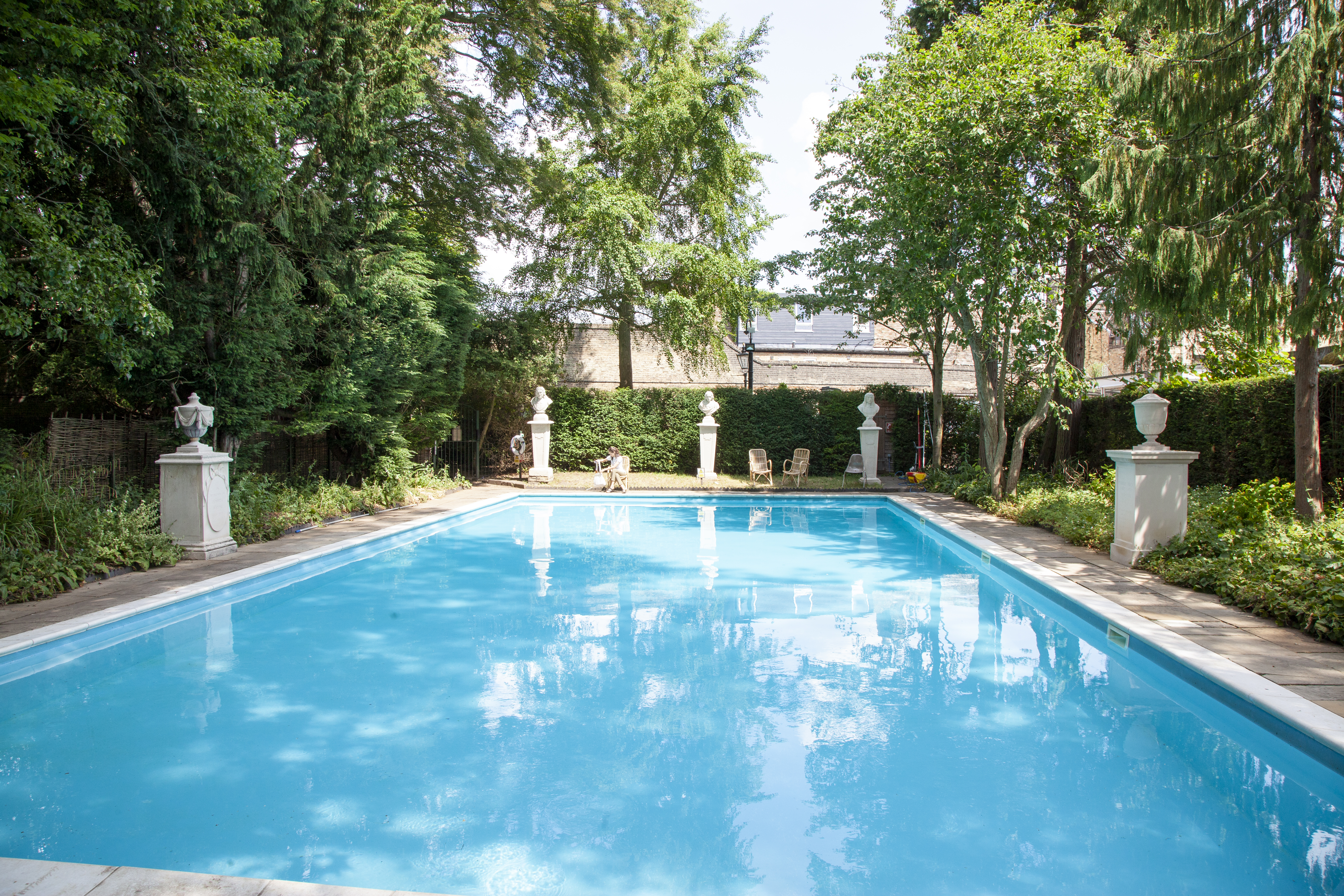
I am looking forward to starting third-year content, which is much more coursework based. Next year, I am writing my dissertation as well as a paper on Latin American history and one on culture along the Silk Roads. My interests over the past two years have mostly been in World History, so I am concentrating on that this year, while still including a lot of variety within that category. My dissertation should be challenging but I am excited at the prospect of doing something completely new.
I am also looking forward to finishing my time on the JCR and possibly looking for new extracurricular activities, including establishing a new Cambridge University History Society.
July 2023
Please be aware if you're considering an application that our student writers describe their experiences. Although the majority of the information stays the same, some details may change from year to year. Do read the student profiles in combination with our undergraduate admissions pages for full information.
Back to Student profiles page / History at Christ's / Home Educated applicants / Next: Laura's profile

